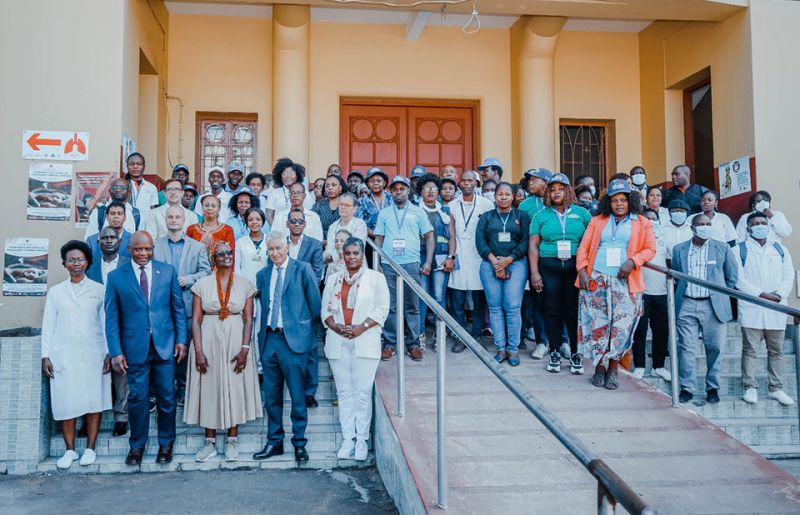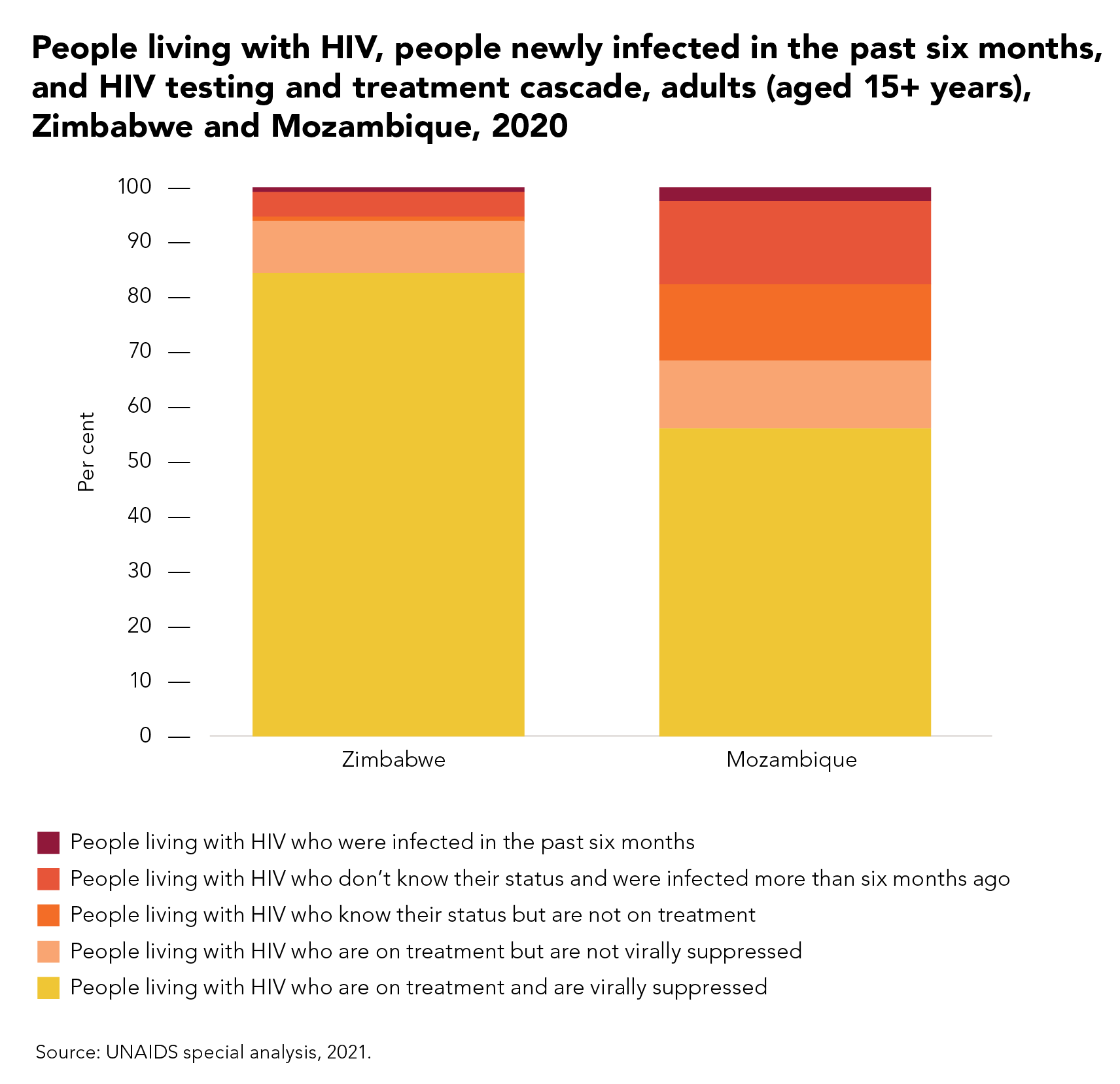This story was originally published by UNICEF
In Mozambique there has been some progress in the fight against AIDS, notably in preventing mother to child transmission of HIV. But progress in preventing new HIV infections among adolescents (10-19) and improving testing and treatment in adolescent populations are still unacceptably slow.
Around 120,000 adolescents live with HIV (UNAIDS 2017). The data also reveals a worrying gender disparity: according to IMASIDA 2015, HIV prevalence among adolescent girls 15-19 is four times higher than for boys (6.5% vs 1.5%). Prevalence is also higher in urban areas than in rural. Young women have higher odds of HIV infection due to various factors including gender norms, reduced access to information, and age-disparate sex. Additionally, not knowing one’s HIV status and engaging in high risk practices predisposes young people to the risk of contracting HIV. This highlights the need for adolescents and young people to have access to appropriate information as they explore their sexuality.
The AIDS epidemic must remain a global public health concern, according to UNICEF and UNAIDS. Innovative solutions must be adopted to speed up progress in preventing HIV infection of children and adolescents and ensuring those living with HIV get the treatment they need.
In 2015, in the context of the youth-focused Sexual and Reproductive Health (SRH) and HIV prevention Geração Biz (Busy Generation) programme, UNICEF Mozambique partnered with line ministries of Youth and Sports; Health; Education and Human Development; UNFPA and the youth association Coalizão (Youth Coalition) to adapt the SMS-based technology for development platform U-Report and roll out the programme known as SMS BIZ. This was aimed at improving adolescent and young people’s access to comprehensive and personalised SRH and HIV information through SMS (for more information visit http://mozambique.ureport.in/).
SMS BIZ partners set up a counselling hub managed by Coalizão with 24 trained peer counsellors, equipped with ICT facilities and a reference guide on SRH, HIV and Gender-based Violence (GBV) prevention to facilitate their capability to respond to adolescents queries. The counseling service is totally anonymous so neither the counsellors nor users can identify the other. Counsellors respond to about 1,000 questions daily. A total of 350,000 questions were responded to date. Communication and promotion materials were developed to promote the counselling service while advocacy sessions were held in selected provinces in order to create synergies with different stakeholders. Partnerships with the three Telecom Operators allowed SMS BIZ partners to count on free un-limited SMS for the period of 2017-2020.
In only two years, SMS BIZ/U-Report, has exceeded expectations with over 110,000 active adolescents and youth registered by September 2017, using the services for information on topics relevant to them.
Adolescents and young people registered have been engaged in discussions addressing misconceptions about SRH, HIV prevention and treatment, and increasing uptake and linkages to HIV and GBV services. Results from a poll show positive results, with 65% of adolescents and young people that responded to the poll were referred and adhered to health facilities during the counselling session for additional individual face-to-face counselling, consultation or treatment.
However, until recently, the challenge has been attracting as many girls as boys to the platform with a ratio of 60% boys - 40% girls. Raima Francisco Manjate, one of the SMS BIZ/U-Report stellar peer counsellors officially launched the Girl-to-Girl invite system on the International Day of the Girl Child on October 11th, with an intervention at the National Girls Conference organized in the context of the UN Joint programme Action for Girls, funded by the Swedish Government. The results have been outstanding: in 72 hours, more than 8,600 girls were successfully registered, the girls' user population grew from 4% to 44%, with five girls registering more than 50 friends and winning the competition.
Today, the total number of SMS BIZ/U-Report users reached 130,000.
The five adolescent and young girls, winners of the competition, have been awarded today at the World AIDS Day Celebrations, in Maputo and in the provincial capitals of Quelimane, Nampula and Beira in recognition of their efforts in mobilising friends to adhere to this important counselling service.
Neima Muianga, 20 years old and Cristina Djive, 18 years old, both from the capital Maputo, were the two girls awarded today at the WAD ceremony, by the following high-level dignitaries such as Mr. Carlos Agostinho do Rosario, Mozambique Prime Minister, Mr. Luiz Loures, UNAIDS Deputy Executive Director, Ms. Nazira Abdul, Health Minister and Ms. Clarisse Machanguana, UNICEF National Ambassador.
Neima was thrilled when she discovered she had won the competition: “I feel happy about it. I have sent various SMS to contact numbers on my list, my neighbours, church members and even girls or young women I would bump into in the streets. SMS BIZ is very important for us. I don’t feel comfortable speaking with my parents about sexuality as this is taboo in Mozambique”.
"It is an excellent example of how young people can empower each other through technologies and innovative projects. Girl-to-Girl (G2G) is the kind of innovation that has an essential role for gender equality and health as we work to leave no one behind in implementing the sustainable development goals," said Luiz Loures, UNAIDS Deputy Executive Director, Assistant Secretary-General of the United Nations.
Now that the SMS BIZ/U-Report initiative has been scaled up at national level, SMS BIZ partners expect to reach and engage approximately 400,000 adolescents and young people by 2020. According to Cristina “this initiative cannot stop. So far, it has been a great experience for us.”
















